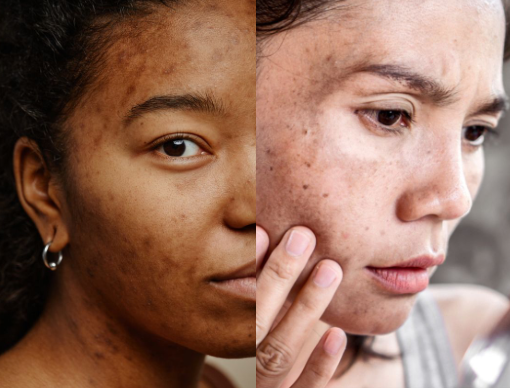What is Hyperpigmentation?
- skinwfa
- Jul 20, 2024
- 3 min read
Written by: Nisha Evangelista

Overview: Hyperpigmentation is a common skin condition characterized by darkened patches or spots on the skin. This occurs when excess melanin is produced and deposited in specific areas. To reduce the appearance of hyperpigmentation effectively, it is important to have a basic understanding of the causes, types, and treatment options available. In this article, I will go over these key things to ensure that you gain a better understanding of hyperpigmentation as a whole.
Causes of Hyperpigmentation
1. Sun Exposure: Ultraviolet (UV) radiation from the sun stimulates melanin production, leading to sunspots or age spots. Prolonged exposure can worsen hyperpigmentation.
2. Hormonal Changes: Conditions like melasma, which often occurs during pregnancy or with the use of birth control pills, cause dark patches on the face due to hormonal fluctuations.
3. Post-Inflammatory Hyperpigmentation (PIH): This type of hyperpigmentation occurs after an injury to the skin, such as acne, eczema, or a burn. The skin darkens as it heals.
4. Medications and Medical Conditions: Certain medications and medical conditions can lead to hyperpigmentation. For example, some drugs can cause discoloration as a side effect, and conditions like Addison’s disease can also affect pigmentation.
Types of Hyperpigmentation
1. Sunspots: Also known as liver spots or age spots, these are small, dark spots that appear on sun-exposed areas like the face, hands, and shoulders.
2. Melasma: Characterized by large, dark patches, melasma often appears on the face, particularly on the cheeks, forehead, and upper lip.
3. Post-Inflammatory Hyperpigmentation: Dark spots or patches that appear after the skin has healed from inflammation or trauma, such as acne scars.
Symptoms of Hyperpigmentation
1. Dark Patches or Spots
2. Uneven Skin Tone
3. Discoloration
4. Reddish or Purple Tint: In some cases, especially with post-inflammatory hyperpigmentation, dark spots may have a reddish or purplish hue.
5. Itching or Sensitivity
Complications of Hyperpigmentation
1. Psychological Impact: Persistent hyperpigmentation can lead to emotional distress, low self-esteem, and reduced confidence.
2. Infection Risk: Scratching or picking at pigmented areas can increase the risk of skin infections.
3. Worsening of Skin Conditions: Hyperpigmentation can sometimes be associated with underlying skin conditions like eczema or psoriasis, and may worsen these conditions if not treated properly and quickly.
4. Uneven Skin Texture: Prolonged hyperpigmentation can lead to changes in skin texture, such as rough patches or scars, which can be more challenging to treat.
5. Increased Sensitivity to Sun Exposure: Areas of hyperpigmentation can become more sensitive to UV light, increasing the risk of further pigmentation changes and skin damage if not adequately protected.
6. Potential for Permanent Discoloration: In severe cases, hyperpigmented spots may become resistant to treatment and lead to long-term or permanent discoloration, especially if the underlying cause is not addressed.
Treatment Options
1. Topical Treatments: Products containing ingredients like hydroquinone, retinoids, vitamin C, and niacinamide can help lighten hyperpigmented areas by inhibiting melanin production and promoting skin renewal.
2. Chemical Peels: Chemical peels involve applying a solution to the skin that exfoliates the top layers, helping to reduce the appearance of dark spots and improve skin texture.
3. Laser Therapy: Laser treatments target melanin in the skin and can be effective for reducing hyperpigmentation. They work by breaking down the excess pigment and promoting skin regeneration.
4. Sun Protection: Using sunscreen with a high SPF is crucial in preventing further hyperpigmentation. Sunscreen helps protect the skin from UV rays, which can worsen existing dark spots and cause new ones.
5. Lifestyle Adjustments: Incorporating a healthy diet rich in antioxidants, staying hydrated, and avoiding excessive sun exposure can support overall skin health and help manage hyperpigmentation.
Conclusion
Hyperpigmentation, while common, can significantly impact both appearance and confidence. Understanding its symptoms, causes, and complications is key to effective management. By utilizing treatments such as topical products, chemical peels, and laser therapy, along with preventive measures like sun protection, individuals can address dark spots and achieve a more even skin tone. A comprehensive approach can improve skin health and enhance overall well-being.
Citation(s)
Disclaimer: Everything posted on our website and Instagram is intended for basic educational purposes only. If you suspect you have symptoms of any condition, it is essential to consult a dermatologist or your healthcare provider for a proper diagnosis and treatment plan. Our content is not a substitute for professional medical care.




Comments